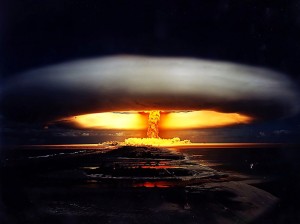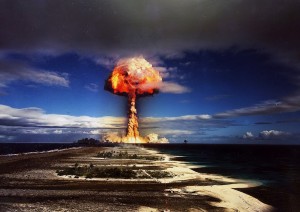France Will Compensate Nuclear Tests Victims


On Tuesday, the French parliament approved a long overdue bill offering compensation to the victims of controversial nuclear tests carried out by France for almost four decades, between 1960 and 1996. French authorities, across the political spectrum, had previously failed to accept responsibility for the numerous and serious health problems suffered by those present or near the test sites.
The compensation will apply to former military and civilian personals which developed cancers, including leukemia and thyroid cancer, after repeated exposure to radiation from nuclear tests, which were conducted in Algeria and French Polynesia.
The French Ministry of Defense says some 150,000 civilian and military personals took part in the tests and will be eligible for compensation. Residents living near the sites will qualify as well. The victims of radiation have been campaigning for years for justice and recognition of wrong doing from the French state. France Defense Minister, Herve Morin, announced that an initial fund of 10 million Euros has been put aside and will be allocated to the victims.
A special committee will take complaints in consideration on a case-by-case basis to determine whether the plaintiff’s symptoms and illnesses are related to the 18 major health problems identified by the United Nations Scientific Committee on the Effect of Atomic Radiation.
Between 1960 to 1996 France carried out a total of 210 nuclear tests. The first one took place deep into the Sahara desert in Algeria, then a French colony, but most of the subsequent tests were held in French Polynesia. On August 24, 1968 France tested its first hydrogen bomb, which was 170 times more powerful than the Hiroshima bomb, above the Fangataufa Atoll in French Polynesia. The photographs illustrating this article were taken in 1970 by the French army, and they fully show the power of the nuclear blasts above the Atoll. In 1985, France opted out of the Treaty of Rarotonga, which declares the South Pacific a nuclear weapon-free zone.
On January 27, 1996, under the Chirac administration, France conducted its last nuclear test at Fangataufa. And finally due to growing protests in Polynesia, international pressures- notably from New-Zealand- and the actions of the environmental group Greenpeace, France stopped testing its nukes altogether and signed the Treaty of Rarotonga.
It is shameful that it took 36 years for France to stop testing its nukes and another 14 years to assume its responsibility, but at least a sad page was turned today on a grim chapter of French history.
Related Articles













You must be logged in to post a comment Login